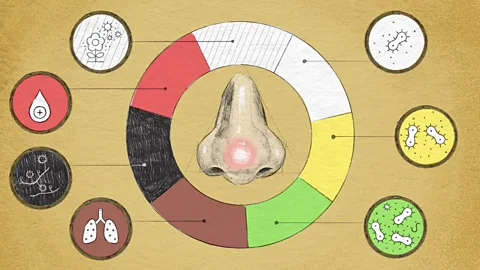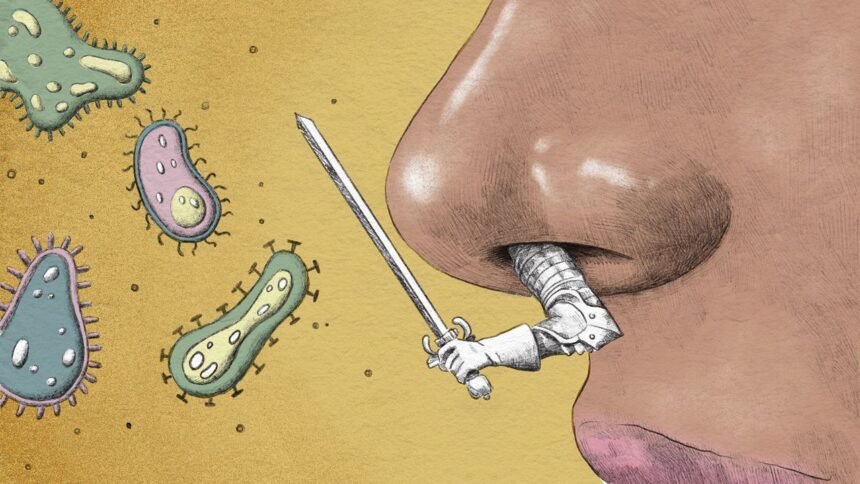Snot and Your Health: What Nasal Mucus Reveals About Your Body

The Protective Power of Snot: What Your Snot Reveals About Your Health
What your snot reveals about your health may surprise you. While it might seem unpleasant, snot is one of the most underappreciated defense mechanisms in the human body. Composed of water, proteins, enzymes, and sugars, this sticky substance lines your nasal passages and acts as a first barrier against airborne invaders such as viruses, bacteria, dust, and allergens.
Snot doesn’t just trap foreign particles—it also moisturizes your airways, preventing dryness and irritation. With the help of microscopic hairs called cilia, mucus constantly moves contaminants out of your nose and into the throat, where they’re either swallowed or expelled.
Ancient Theories and Modern Science: Decoding What Your Snot Reveals About Your Health
In ancient medicine, nasal discharge was one of four bodily “humours” believed to shape health and temperament. Hippocrates theorized that an imbalance of phlegm, blood, black bile, and yellow bile caused illness and influenced character. While those theories have long been debunked, today we’re learning that what your snot reveals about your health is far more scientific and measurable — offering real-time insight into immunity, infection, and inflammation.
Today, science reveals that snot is far more than a historical curiosity—it’s a living, adaptive substance with diagnostic potential.
What the Color of Your Snot Reveals About Your Health
Your snot’s color can offer quick, visible cues about what’s happening inside your body:
- Clear: Common during allergies or irritation; signals the body’s effort to flush out irritants like pollen or dust.
- White: May indicate a viral infection; reflects increased white blood cell activity.
- Yellow or Green: A sign of dead white blood cells fighting infection; not necessarily bacterial.
- Red or Pink: Traces of blood may signal dryness, irritation, or minor injury from frequent nose-blowing.
The Nasal Microbiome: A Microscopic Universe
Much like the gut microbiome, your nose hosts a diverse array of microbes—including bacteria, viruses, and fungi—that influence your health. Everyone’s nasal microbiome is unique, shaped by factors such as age, gender, environment, diet, and habits like vaping.

Recent studies show that this nasal ecosystem plays a key role in immune response, inflammation, and disease resistance. For example, the ability of certain harmful bacteria, like Staphylococcus, to colonize your nose can depend on how other microbes compete for vital nutrients like iron.
Building a Healthy Microbiome—Through Snot
Scientists are now exploring the possibility of improving health by manipulating the snot microbiome. Researchers from Oxford University are testing nasal sprays that introduce “good” bacteria to crowd out pathogenic species.
Think of it like probiotics for your nose—boosting beneficial microbes to prevent infections and reduce inflammation. This could someday lead to nasal treatments for chronic respiratory conditions and improved immunity.
Snot and Vaccine Effectiveness
There’s growing evidence that the state of your snot microbiome can influence how your body responds to vaccines. Studies show that certain nasal bacteria may enhance—or hinder—the immune response following vaccination.
Understanding this connection could pave the way for next-generation nasal vaccines that not only prevent disease but also stop transmission.
The Diag-nosing Revolution
In Sweden, a small clinical trial tested whether snot transplants—using nasal mucus from healthy individuals—could treat chronic sinus issues and hay fever. Participants administered donor mucus via nasal spray for five days.
Results were promising: over 70% experienced noticeable relief for up to three months, with no adverse effects. Larger trials are underway to track the changes in microbial populations and better understand the healing potential.
Snot as a Diagnostic Tool
Beyond allergies and infections, snot may help detect serious diseases. Researchers are analyzing nasal mucus to find biomarkers for:
- Chronic obstructive pulmonary disease (COPD)
- Asthma and lung cancer
- Alzheimer’s and Parkinson’s disease
- Radiation and pollution exposure
For instance, elevated levels of the immune protein IL-26 in nasal fluid could indicate a higher risk of developing COPD, allowing for earlier intervention.
Snot in Personalized Medicine
“Snot is the future of personalized medicine,” says one researcher. By decoding the biological signals in nasal mucus, we can better understand individual risk factors, tailor treatments, and monitor disease progression with non-invasive testing.

This approach may one day rival blood tests in clinical importance, offering a simple yet powerful diagnostic method from something we all produce daily.
Final Thoughts
From an ancient medical curiosity to a cutting-edge diagnostic tool, snot is gaining new recognition for its vital role in human health. It guards our airways, reflects our immune status, and may soon help doctors diagnose and treat a wide range of conditions more efficiently and comfortably than ever before.
So next time you reach for a tissue, remember: your snot is smarter than it looks.




